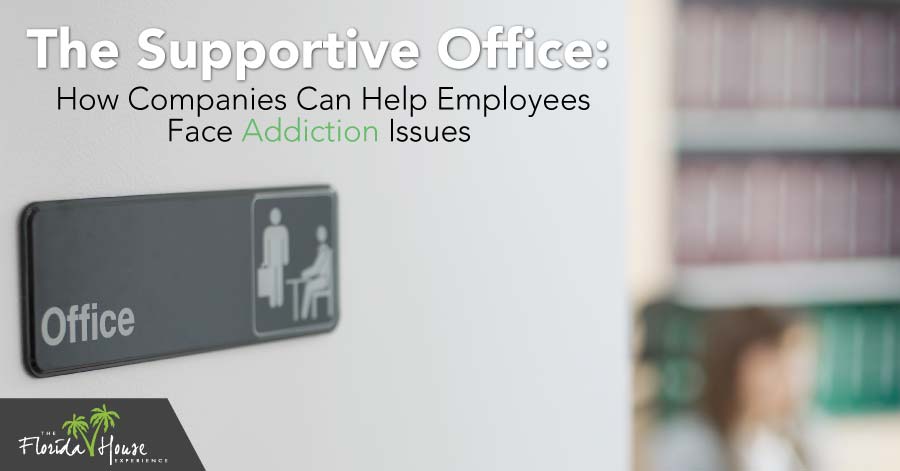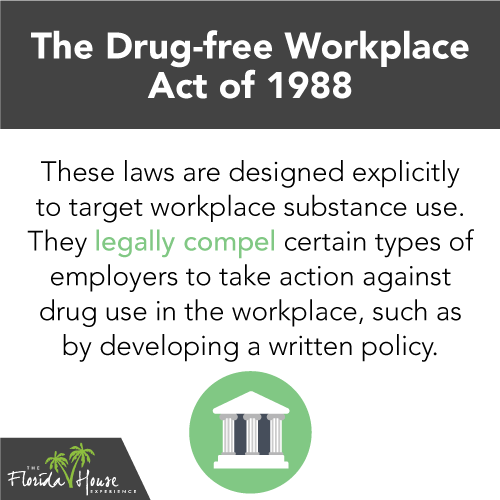
Substance addiction is not selective. Mothers, teachers, your auto mechanic and holders of PhDs are all vulnerable to becoming addicted to alcohol abuse, illicit drugs, or prescription drugs. Today, business owners are not only dealing with balancing budgets and increasing revenue against stiff competition, but they are also coping with employees who are struggling with an addiction.
What are Effective Strategies Company Owners can Utilize to Help Addicted Employees?
Drug-free Workplace
 Establishing drug-free workplaces should be the first thing owners do to dramatically reduce the risk of employees accessing addictive substances. Currently, any company doing business with the U.S. government must adhere to rules enacted by the Drug-Free Workplace Act of 1988.
Establishing drug-free workplaces should be the first thing owners do to dramatically reduce the risk of employees accessing addictive substances. Currently, any company doing business with the U.S. government must adhere to rules enacted by the Drug-Free Workplace Act of 1988.
However, companies not working with the federal government can also apply these guidelines to workplace protocols meant to educate employees about substance abuse and provide rehabilitation when needed. Companies should also offer insurance to cover substance abuse treatment expenses while making sure employees remain aware of the dangerous consequences of using drugs in the workplace.
Random Drug Testing
During interviews, employers should inform prospective employees that they perform random drug tests on all employees. Drug testing using urine samples detect both prescription and illegal drugs such as opioid pain relievers, heroin, methamphetamine, and cocaine. If an employee tests “positive” for a drug, managers might consider offering the employee the option of entering a drug treatment program (inpatient or outpatient, depending on how severe the addiction is). Firing an employee with a substance addiction should be a last resort for business owners.
Approaching Employees Suspected of Drug Addiction
Managers receiving information from other employees that an employee may be addicted to drugs or alcohol may choose to observe the employee themselves for a short time or approach the employee in a non-confrontational manner.
Signs of employees who may be using drugs or drinking on the job include:
- Taking longer than normal lunches and coming back appearing drowsy, disoriented or smelling of alcohol
- Changes in personality or behavior relative to when the employee began working for the company
- Making questionable decisions and/or showing bad judgment regarding projects/work ethics
- Failing to meet deadlines and offering unsatisfactory excuses
- Increasing lack of attention to personal hygiene
- Taking frequent bathroom breaks (other employers may notice the employee locking themselves in bathroom stalls for long periods)
Managers should also realize that signs of addiction may indicate someone is suffering psychological problems such as severe depression or anxiety. To find out exactly what is affecting the employee’s performance at work, managers need to talk privately with the employee in a way that is empathetic, sensitive and non-judgemental.
Outpatient Treatment for Employees with Substance Abuse Issues
Health insurance offered by company owners should include financial assistance for employees wanting outpatient treatment for their addiction. Outpatient programs are recommended for people who do not require detoxification but need counseling and therapy services to help defeat their addiction.
People in outpatient treatment receive a variety of services. Individual and group therapy address the difficulties of overcoming addiction, how to prevent relapse and coping with cravings. During outpatient counseling, patients also learn why they became addicted and how they can cope successfully with mental health problems contributing to their addiction.
Company managers should do extensive research regarding outpatient treatment services. Treatment should help addicted employees learn about the mental, physical and social aspects of addiction. This is key to facilitating recovery, recognizing situations that may trigger use and learning how to fight patterns of thought and behavior that reinforce the habit.
For more information about how company owners can help their employees with addiction issues, please call FHE Health today.






